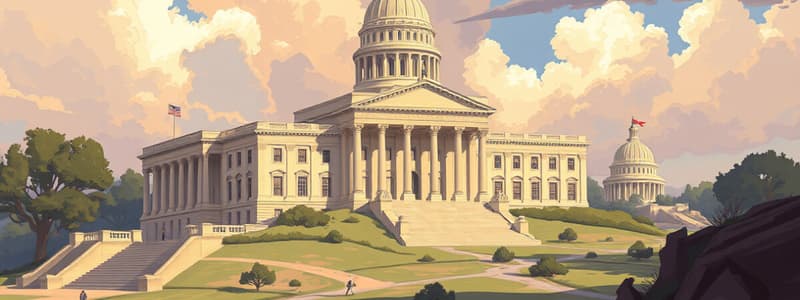Podcast
Questions and Answers
What is federalism?
What is federalism?
Federalism is a system in which governmental power is divided into two or more levels, usually a central government and component state governments.
What are the two forms of delegated powers of the national government?
What are the two forms of delegated powers of the national government?
- Implied powers (correct)
- Concurrent powers
- Enumerated powers (correct)
- Reserved powers
Local governments are mentioned in the Constitution.
Local governments are mentioned in the Constitution.
False (B)
What do reserved powers provide to the states?
What do reserved powers provide to the states?
Which amendment restricts both state and national governments in denying citizens' rights?
Which amendment restricts both state and national governments in denying citizens' rights?
What role did Chief Justice Marshall play in federalism?
What role did Chief Justice Marshall play in federalism?
The powers not delegated to the national government nor denied to the states are reserved for the ______.
The powers not delegated to the national government nor denied to the states are reserved for the ______.
The national government has no authority over state laws.
The national government has no authority over state laws.
Flashcards are hidden until you start studying
Study Notes
Federalism in the United States
- Federalism divides governmental power between a central government and state governments, creating a multi-layered governance system.
- There is a horizontal division of power (federal vs. state) and a vertical division (executive, legislative, and judicial branches).
- Limited government is aimed at restraining tyranny by distributing power among several entities.
Division of Powers
- Powers of the national government are defined by the Constitution and consist of delegated powers, which include:
- Enumerated Powers: Specifically listed in the Constitution.
- Implied Powers: Not explicitly mentioned but inferred from enumerated powers.
Reserved Powers
- Powers not delegated to the national government or prohibited to states are reserved for states and citizens.
- States can implement local systems of public education, infrastructure, and regulate activities like alcohol sales.
- Businesses may favor states with laws more conducive to their industry, highlighting the importance of state discretion.
Constitutional Restrictions
- The Bill of Rights restricts both national and state governments from infringing on individual freedoms like worship and due process.
- Powers outside national and state authority are reserved for the people, allowing citizens freedom where no law is present.
Role of Local Governments
- Local governments (counties, cities, townships) are not mentioned in the Constitution but execute state laws.
- Federal law is supreme; state laws must align with national laws and Supreme Court decisions.
Evolution of State and National Powers
- Historically, states held more power and independence, crucial in social and political structures.
- Over time, the federal government gained supremacy due to economic, political, geographical, and social changes.
- Post-war America saw a shift from agrarian to industrial, resulting in larger government entities across all levels and enhanced federal authority.
- The perception of the federal government changed as social dynamics evolved, emphasizing its prominent role in citizens' lives.
Studying That Suits You
Use AI to generate personalized quizzes and flashcards to suit your learning preferences.




